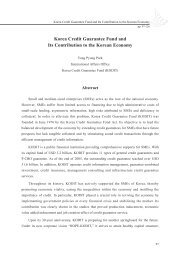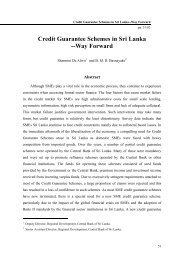Is Equity-Financing Always Optimal for Innovative SMEs? --How ...
Is Equity-Financing Always Optimal for Innovative SMEs? --How ...
Is Equity-Financing Always Optimal for Innovative SMEs? --How ...
You also want an ePaper? Increase the reach of your titles
YUMPU automatically turns print PDFs into web optimized ePapers that Google loves.
第 25 期tend to get equity funding intentionally at the later stage when they proved their businesspotential to a visible degree, and thus have stronger bargaining power.Pecking-order theory, first suggested by Donaldson in 1961, supports this idea. It statesthat companies prioritize their sources of financing from internal financing to debt financing,and lastly to equity financing in accordance with the principle of least ef<strong>for</strong>t and of leastresistance, preferring equity as a financing means of last resort.Also, many strong companies do not want to go public even at the stunning marketvaluation. According to an article in The Economist, 11published on Feb 24 th 2011, Mr.Ohlsson, CEO of IKEA group, the highly successful global furniture maker whose successwas analyzed to come from lean operation, shrewd tax planning, and tight control, said thatIKEA is more competitive as a privately owned company. Instead of sweating to meet thequarterly targets the stock market demands, it can concentrate on long-term growth.According to a paper recently written in UK, 12out of total <strong>SMEs</strong> in UK looking <strong>for</strong>external finance, only around 1-2% is looking <strong>for</strong> equity finance. Working <strong>for</strong> the last 10years in the field of SME financing in Korea, I would say the situation is not that differentalthough I failed to figure out the exact percentage from credible statistics. Why is this so?(b) Big-success potential is not visible from early or R&D stageThere are also cases when VCs, entrepreneurs themselves, or both sides fail to noticethe scalability of business at early stage. Uncertainties at early stage of technology businessoperation or R&D stage are often not clearly detectable even <strong>for</strong> the most seasoneddealmakers.11 For more detail, please see http://www.economist.com/node/1822940012 SME Access to External Finance, January 2012, BIS ECONOMICS PAPER NO. 16154
















